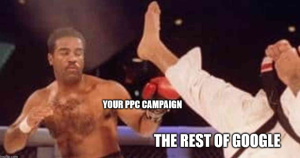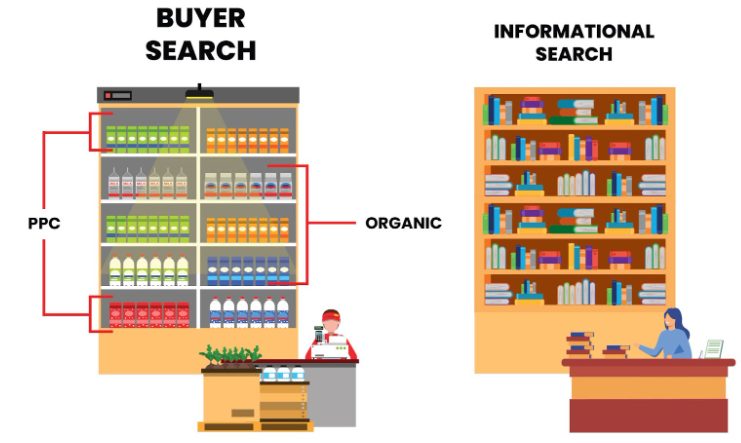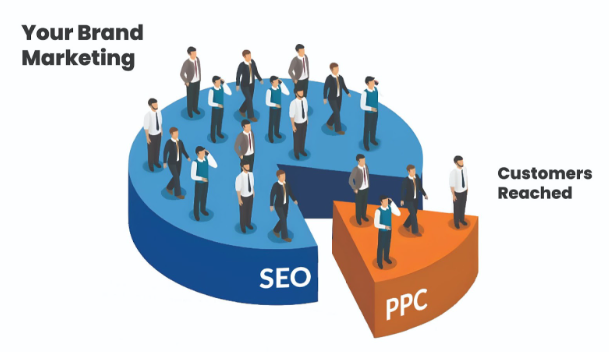Chad DeBolt is the personality behind and founder of Surchability. He’s been heavily involved with online marketing, specifically SEO, for 16 years.
When it comes to online marketing, SEO often feels like the weird emo cousin that no one really understands or talks to at family gatherings.

Sure, you’ve heard of it and know you need it, but what does it actually do for your business?
After reading this blog post, you will not only understand the power behind SEO…why it’s a drastically smarter way to grow your business vs. PPC…but also learn a little marketing psychology along the way….just what you were hoping to accomplish when you woke up this morning right?

According to the Ehrenberg-Bass Institute for Marketing Science, brands grow by increasing sales to new customers. So, rather than obsessing over cross-selling or loyalty programs, your marketing strategy should focus on improving your brand’s mental and physical availability and sales activation activities to grow your sales.
So there you have it. No need to read the rest of the blog post. I just gave you the secret formula to success. Now go out there and smash it.

Wait, what do those terms even mean?
1. Increasing a brand’s mental availability:
Imagine you’re at a grocery store, staring at a shelf full of different brands of cereal. Suddenly, a particular brand pops into your mind, and you reach out for it without even thinking twice. Congratulations! That’s mental availability at work! The more likely your brand comes to mind in a buying situation, the higher its mental availability.
2. Increasing a brand’s physical availability:
Now, let’s say you want to buy that same cereal brand, but the store you’re in doesn’t carry it. You’d have to go out of your way to find it, which can be a major inconvenience. The easier and more convenient it is for people to buy your product, the higher your physical availability is.
3. Sales activation activity:
You’re scrolling through your social media feed and come across an ad for your favorite sneakers. They’re offering a limited-time discount, and you suddenly feel the urge to purchase them right away. This direct advertising strategy is called sales activation activity. It’s designed to entice future buyers to act sooner, often through special offers.
Imagine you’re back at the grocery store, and you come across two identical products. They’re the same price, same flavor, same everything. The only difference? One has a recognizable brand name, while the other does not. Which one do you choose? Chances are, you’ll go for the branded product. And that, my friends, is the power of brand building.
Brand building is a critical aspect of business growth. It’s what can make your customers choose you over your competitors, even if you’re selling the same product at the same price. And when a brand achieves this kind of recognition, it can use the extra profit to invest in marketing, innovation, and further growth. That’s why brand building is so important.
Have you ever noticed that some brands seem to be everywhere? Whether it’s billboards, TV commercials, or even at special events, you just can’t escape them. It’s like they’ve taken up permanent residence in your mind, right?

That’s one way of gaining brand recognition. Physical availability can strengthen your brand’s mental availability—the key to building brand recognition.
Think about those big brands like Coca-Cola and Red Bull. Their logos and ads seem to follow you wherever you go. They’ve mastered the art of being present in your life, and that’s why their brands are so deeply ingrained in your mind.

They’ve etched themselves into our minds by strategically investing in physical presence across multiple channels and touchpoints. It’s a brilliant way to ensure that they’re the first name that springs to mind when we think of energy drinks or soft drinks.
Remember, the path to brand recognition begins with being seen and staying present.
Imagine you’re a boxer training for a big fight. You’ve trained hard, but when you step into the ring, you realize you can only use one hand. That’s what relying solely on PPC advertising can feel like. Sure, you might land a few punches, but you’re also going to miss a ton of opportunities to knock out the competition and dominate the market.

Don’t get me wrong, PPC has its place in marketing. It’s like those impulse-buy items you see near the cash register or the products strategically placed on the top shelf of your supermarket aisle. But while PPC might give you that prime spot on the shelf, it doesn’t necessarily help your brand grow. You wouldn’t even think about it unless you were planning to buy it.
That’s the problem with PPC – it can only capture a small portion of today’s buyers.
This sets the stage for an unfair fight, as it’s too late to build brand recognition. It’s like tossing a small pebble into a vast ocean of potential customers, hoping to create a tidal wave of sales. Instead, you only make a few ripples, which isn’t enough to make a lasting impact.
Another reason why PPC won’t grow your brand is that it’s like a high-stakes bidding war. The more competitive the market, the higher people bid, and the more expensive the click costs. It’s like trying to get prime real estate on the supermarket shelf, but you’re only getting the top spot temporarily. And as soon as you stop paying, you’re kicked off the shelf.

PPC is like rocket fuel that burns through your profit.
Even if you maintain an ongoing PPC strategy for years, you’ll only attract a tiny fraction of potential customers. Meanwhile, your PPC costs are skyrocketing faster than a SpaceX rocket, eating into your profits. Before you know it, your marketing budget is up in smoke, and you’re left wondering if it was all worth it.
So, while PPC can give you a temporary boost in visibility, it’s essential to remember that building a strong, recognizable brand requires more than just a few clicks. It’s about creating a lasting presence in the minds of your target audience, and that takes a multifaceted approach that goes beyond PPC.
But here’s where brand marketing steps in and takes the spotlight. By utilizing advertising, social media, and PR, brand marketing reaches not only those in the market to buy but also those who are still exploring their options. It introduces your brand to a wider audience and creates a lasting impression about your brand.
The goal of brand marketing is to plant seeds of familiarity and trust so that when the time comes for customers to make a purchase, your brand is the obvious choice. The stronger your brand marketing efforts, the higher the chances of winning those customers over.
SEO or organic search gives your brand a competitive edge by doing three things.
1. Reaching the “ready to buy” crowd.
More than PPC advertising, SEO helps you connect with a greater number of people who are ready to make a purchase today.
2. Connecting with future buyers.
SEO also reaches those who are researching the category and planning to buy in the future. Think of it as planting seeds today that’ll grow into a lush garden of customers down the road.
3. Engaging the non-buyers.
And here’s the cherry on top: SEO reaches people who aren’t even in the market to buy through broad informational content. It’s like being the popular kid at school – even if they’re not buying, they’re talking about you!

Having a strategic and well-thought-out SEO plan allows you to be at the right place, at the right time, with the right message. Doing so increases your brand’s credibility and mental availability, making it more likely that potential customers will choose your brand over a competitor.
What sets SEO apart from PPC is that it’s more like a marathon than a sprint. You can’t simply buy your way to the top of the rankings – you have to earn it.
So, when it comes to deciding where to invest your marketing budget, don’t think of it as a battle between PPC and SEO. Instead, think about where you want to make your mark. Sure, you can make money by focusing solely on PPC, but it’s like trying to fill a swimming pool with a garden hose. You’ll get there eventually, but it’s slow and inefficient. Or you can invest in SEO and capture the entire market. If you are looking for growth, SEO is the way to go.
When you’re out cruising around Google, searching for answers, products, or inspiration, as you type in your keywords or phrases, Google morphs into your trusted advisor, sifting through endless pages online to find those hidden gems that perfectly match your queries.
These queries typically fall into three categories:
This is what we refer to as Organic Search. It’s a crucial aspect of marketing science for brand growth.
Broadly, these searches can be divided into two main categories: buyer search terms and informational search terms.

Buyer search refers to the process in which potential customers actively search for information, products, or services related to their needs or desires. These searches are typically conducted with the intention of making a purchase decision. The individuals performing buyer searches are actively seeking solutions, product recommendations, comparisons, or reviews to guide their purchasing choices. They are in the later stages of the buyer’s journey and are looking for specific information that will help them make an informed decision.

On the other hand, informational search revolves around seeking general information or answers to problems without the direct intention of making a purchase. Individuals engaging in informational searches may be in the early stages of the buyer’s journey, conducting research and gathering information before considering specific products or services.

By catering to both types of searches through targeted and informative content, businesses can increase their visibility, engage potential customers, and ultimately drive sales.
To target buyer search terms, we craft content that provides detailed information about your products or services, addresses common questions or concerns, and highlights the unique value propositions that make your brand stand out. It’s like waving a shiny flag that says, “Hey, look over here! We’ve got the answers you’re looking for, and our stuff is pretty awesome, too.”
On the other hand, to target informational search terms, you’ll need to create educational and informative content that establishes your expertise in the industry. It’s like being the wise sage who provides valuable insights, tips, and resources to those seeking knowledge.

By building trust and credibility among potential customers who are in the early stages of their research, you position your brand as a reliable and trustworthy source of information. And when the time comes for them to make a purchase decision, they’ll remember your brand and be more likely to choose you over your competitors.
Imagine you’re at the races, and you’ve got to choose between two horses: one is a flashy, high-priced stallion that promises quick returns but might also gas out at the first turn, while the other is a steady, reliable workhorse that’ll get you to the finish line. Which one would you bet on?

Many businesses face a similar dilemma when it comes to allocating marketing budgets between paid search (PPC) and organic search (SEO). PPC is often seen as the go-to solution for immediate sales, while SEO seems like a slow and steady approach. But is putting all your money on the flashy PPC horse really the best strategy?
Sure, PPC can generate instant sales that are easy to measure and justify. But let’s not forget that it only targets a tiny fraction of the market: those who are ready to buy right now. So, when businesses shift the lion’s share of their budget to PPC after seeing initial results, they’re actually stunting their growth and missing out on a huge chunk of potential customers.

Of course, there are other methods to grow your brand. Plenty of brands were built through PR, TV ads, and social media. Organic search is one of many channels to grow your brand. The difference is it’s a lot cheaper compared to others.
Most people assume that SEO is more or less the same as free ads. Well, it’s not.
Think of organic search as the channel and SEO as a strategy within that channel that helps you reach more people without shelling out more cash for ads.
Organic search refers to the natural, un-paid search results that appear on search engine result pages (SERPs) when users enter specific keywords or phrases. These results are determined by a multitude of factors, such as relevance, authority, and user experience.
SEO is the practice of fine-tuning your website’s content, structure, and other elements to improve its visibility and ranking in organic search results. SEO makes sure your website looks its absolute best to woo search engines and land that coveted top spot on SERPs, ultimately driving more organic traffic to your website.
SEO is the unsung hero working behind the scenes.
Now, SEO isn’t some fly-by-night operation. It’s a long-term commitment that requires ongoing efforts to optimize your website and maintain its visibility in organic search results. Think of it as a marathon, not a sprint. You can’t just slap on some SEO tactics and expect instant results. Search engines constantly evaluate and update their algorithms, so you need to stay on your toes and keep up with the ever-changing digital landscape.
So, why bother with this long-term relationship with SEO? Because organic search traffic is like a fine wine – it gets better with time. When your website ranks well in organic search results, it signals to potential users that your content is relevant and authoritative. This, in turn, attracts high-quality, targeted traffic – the kind of users who are genuinely interested in what you have to offer.
SEO is about leveraging the algorithmic code of search engines to reach more people without shelling out extra cash for ads. You don’t pay for clicks; you pay for the expertise and hard work of an SEO agency.
And the great thing is –

Let’s talk about the oft-overlooked aspect of organic search: informational content.
Informational content is crucial in creating mental availability and building trust among the target audience. It can enhance mental availability by ensuring that your brand remains top-of-mind for potential customers. When you consistently produce valuable and relevant content, such as blog posts, articles, videos, and social media updates, you increase the chances of being remembered by your target audience.
You position your brand as a reliable and trustworthy authority in your industry when you consistently deliver high-quality content that educates, solves problems, and adds value to your customers’ lives.
By engaging with your audience through informational content, you also enhance your brand’s visibility, making it more likely for potential customers to think of your brand when the time comes to make a purchase.
This type of content makes up a significant portion of the search, and businesses can use it to their advantage in various ways.
Let me share a personal experience that highlights the importance of mental availability and trust built through SEO and informational content.
| Recently, when I decided to plan a much-needed vacation, I turned to the internet to research various travel destinations and find the best deals.
As I browsed different travel websites and online booking platforms, I entered the mindset of a “hot buyer,” eager to make a decision quickly. In the midst of my search, one particular travel agency caught my attention with its strong organic search rankings and informative content. Their website appeared at the top of the search results, providing valuable insights about popular destinations, travel tips, and customer reviews. The well-crafted content not only answered my questions but also instilled a sense of trust and credibility in their services. Rather than being swayed by paid advertisements (PPC), it was the mental availability and trust they built through their SEO efforts that influenced my decision. The fact that their website consistently appeared at the forefront of my search results, combined with the helpful and reliable content they provided, made them stand out from the competition. Ultimately, I chose to book my vacation through this particular travel agency, feeling confident that they would deliver a memorable experience based on the trust I had developed through their informative content and prominent search presence. |
Here’s the valuable lesson we can take away from this story: It’s time to debunk the myth that PPC alone is the ultimate solution to all your business challenges. Instead, embrace the power of SEO and the creation of informative content that builds trust and establishes mental availability. Adopting this approach opens the door to greater growth and unlimited potential, positioning yourself as the true victor in the competitive landscape.
By strategically blending various marketing tactics and investing in activities that boost your brand’s mental and physical availability, you pave the way for continuous expansion and lasting success. Moreover, by optimizing your website for SEO, you secure your brand’s rightful place at the forefront of customers’ minds and ensure effortless discoverability, resulting in increased sales and revenue.
So, don’t be afraid to bring up the mysterious cousin at your next family gathering – SEO might just hold the key to unlocking your business’s unprecedented growth. Invest wisely, prioritize mental availability, and witness the transformative impact it has on your brand’s trajectory.
Remember, the magic lies in the harmonious combination of SEO, compelling content, and a comprehensive marketing strategy.

Embrace this winning formula, and watch your business soar to new heights of prosperity.